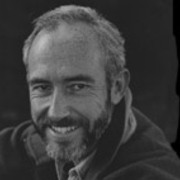
Rod Morris
Auckland-born Rod Morris joined a naturalist's club while growing up in the Waikato. He would go on to look after leopards and puma, while working as a zookeeper at Auckland Zoo.
In 1970, Morris achieved his childhood dream of working at the NZ Wildlife Service; his long interest in islands, and island conservation can be dated from this time. Over the next six years he was involved in kākāpō searches in Fiordland, takahē recovery and efforts to save the Chatham Island black robin.
During this period he developed an interest in photography and writing, especially for children. He wrote the first of many stories for the long-running School Journal. Morris would go on to write or co-write more than 30 books.
After a spell as a school teacher, in 1980 Morris joined the fledgling team of filmmakers and wildlife enthusiasts at TVNZ's Natural History Unit, after NHU head Michael Stedman sent him an envelope containing a return air ticket to Dunedin. The organisation would later experience major expansion, a new name (Natural History New Zealand) and a new owner (Fox Television Studios).
Morris began as a researcher on show's like children's natural history programme Wildtrack. He got his break as a director after arriving on Stewart Island to help out on an early Wild South documentary about kākāpō, and director Peter Hayden told Morris he was calling the shots.
Morris would play a major hand in bringing a series of popular and award-winning documentaries about the Chatham Island black robin to the screen, including producing and directing The Black Robin: A Chatham Island Story (1989).
The natural history documentaries directed (and often produced) by Morris are typically about island species. They have received international acclaim. Early NHNZ doco Kākāpō: Night Parrot scored a number of gongs at the International Wildlife Film Festival at Missoula (United States), and was also runner-up for best film of the fest. The Black Stilt won the Gold Award at New York's International Film & TV Festival.
Morris would continue his award-winning run of bird docos in the 90s, when 1993's Kea: Mountain Parrot took away three awards at specialist wildlife film festivals in France. The documentary presented a dilemma, with images that were in danger of turning viewers against the bird: Morris' crew succeeded in capturing footage of kea attacking sheep at night. A reward of $10,000 for proving keas attacked sheep mysteriously disappeared during production.
Morris also travelled to Indonesia to direct documentary Dragons of Komodo, which was nominated for an Emmy award, and had further international success with Ghosts of Gondwana, which delves into the animals found in New Zealand's forests after dark — namely a Kiwi, a bat, and a monstrous-looking grasshopper wētā. Gondwana was a co-production between NHNZ and the National Geographic Channel. As well as directing, Morris also shot the doco's bat-birthing sequences. Morris counts the film as his personal favourite.
Since 2003 Morris has devoted less time to television, in order to concentrate on his first love: still photography, and writing about New Zealand's wildlife. His work often appears in NZ Geographic Magazine and Forest & Bird.
He has also co-authored or taken photographs for many guides to New Zealand wildlife, including a number co-authored by his NHNZ colleague Alison Ballance. Wild South's Living Treasures of New Zealand, by Morris and Peter Hayden, and inspired by the show they both worked on, was a 1996 Montana Book Awards finalist. Wētā: A Knight in Shining Armour, written by Joy Cowley and photographed by Morris was finalist in the 2003 NZ Post Children's Book Awards.
Morris continues to spread his energies across many fields — from lecturing on filmmaking at Otago University, lobbying against degradation of the Waitaki braided river system and mining on the Denniston Plateau, to searching for alpine geckoes in remote Fiordland valleys, and working as a tour guide in the Antarctic Peninsula.
In 2019, Morris was named an Officer of the New Zealand Order of Merit for services to documentary filmmaking, natural history and conservation.
Profile updated 4 June 2019
Sources include
Rod Morris website. Accessed 4 June 2019
'Rod Morris: A life filming in the wild...' (Video Interview) NZ On Screen website. Director Andrew Whiteside. Loaded 10 October 2016. Accessed 4 June 2019